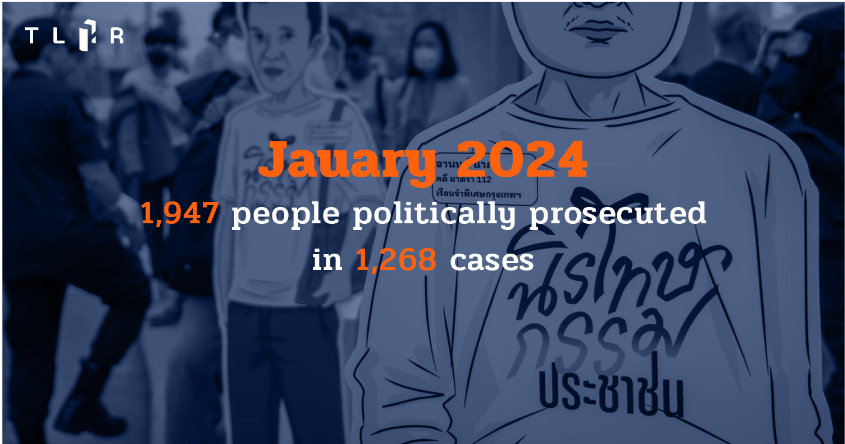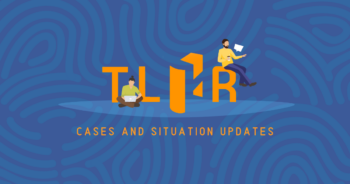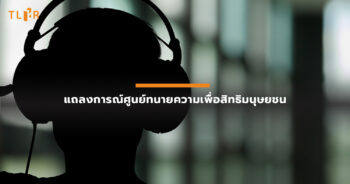The inaugural month of 2024 saw a slight uptick in the number of political cases, characterized by four new lawsuits, including at least one lèse majesté case. The courts continued to pass judgments for cases that arose between 2020 and 2022 throughout the month, with eleven lèse majesté cases reaching the courts’ decisions. A notable decision came from the Court of Appeals, where an individual was sentenced to a prison term of 50 years. Meanwhile, at least eight other cases, e.g. Emergency Decree, received judgments, with outcomes being both positive and negative.
According to the TLHR statistics, at least 1,947 people have been prosecuted in 1,268 cases due to political participation and expression from the beginning of the “Free Youth” protest on 18 July 2020 to 31 January 2024.
Among these are 217 cases against 286 children and youths under 18 years old.
Compared to the end of 2023, four lawsuits have been filed resulting in nine additional individuals being accused/prosecuted (only accounting for those who has never previously been charged).
If we include individuals charged redundantly across multiple cases, the total number of prosecution instances amounts to at least 3,962.
The cases can be categorized according to the charges as follows:
- Charges under Section 112 (Lèse-majesté) of the Criminal Code: at least 263 individuals in 288 cases.
- Charges under Setion 116 (Sedition) of the Criminal Code: at least 147 individuals in 45 cases
- Charges under violation of the Emergency Decree: at least 1,459 individuals in 664 cases (since May 2020 when the first lawsuit against protesters and political acativists was filed)
- Charges under the Public Assembly Act: at least 179 individuals in 91 cases.
- Charges under the Computer Crime Act: at least 197 individuals in 215 cases/
- Charges under contempt of court: at least 43 indviduals in 25 cases, and charges under insult of court: at least 34 individuals in 10 cases.
Out of the mentioned 1,268 cases, 494 have concluded, meaning that 774 cases are still ongoing at various stages.
In January 2024, the following key events have been noted within the trend of political prosecution:
An additional lèse-majesté lawsuit has been filed, while eleven have received court judgments. The majority of which came from the Court of Appeals.
As far as we are aware, one additional lèse-majesté lawsuit was filed in January, namely the case against Nattapon ‘Bank’ and Katatorn ‘Ta’. The charge stemmed from them publishing an image of themselves holding a piece of paper with texts in front of the portrait of the King and Queen, accompanied by a caption. An arrest warrant was issued for both by the Criminal Code following a complaint filed by Anon Klinkaew with Samran Rat Police Station. However, the process of obtaining a warrant and the subsequent arrest occurred just two days after the submission of the complaint and the police notably failed to issue a summons warrant beforehand. Nattaporn and Katatorn were granted bail after they were brought to court for detention.
Although Katatorn had not previously been charged under lèse-majesté, Nattaporn had. As a result, only one individual was added to the statistics of those charged under lèse-majesté for January.
Regarding the ongoing lèse-majesté trials, eleven cases have received judgments by the courts: Four by the Court of First Instance and seven by the Court of Appeals.
A notable case involves Busbas, who was sentenced to a combined 50 years in prison, breaking the record for the highest prison term in any lèse-majesté case.
The Chiang Rai Provincial Court initially sentenced him to a prison term of 28 years in connection with the fourteen posts he published online. After appeals by both the plaintiff and the defendant, the Court of Appeals Region 5 found him guilty of eleven more counts of lèse-majesté (i.e., 11 more Facebook posts), sentencing him to an additional 22 years in prison. He has yet to be granted bail.
The case of Busbas highlights the issue of the lack of clear standards for Section 112 of the Criminal Code, causing confusion. This ambiguity leaves it to the discretion of the courts to determine whether the protection afforded by this law extends to former kings. Some courts have dismissed these cases, while others have found defendants guilty. The enforcement of Section 112 of the Criminal Code remains ambiguous.
In January, the courts found Anon Nampa and Patsaravalee ‘Mind guilty of lèse-majesté, two protest leaders of the 2020-2021 mass protests. The charges stemmed from a post published online regarding monarchy reform and a speech about the power of the current monarchy. Both defendants were convicted under lèse-majesté, with Arnon being sentenced to an unsuspended four-year prison term and Patsaravalee being sentenced to a two years prison term (suspended for three years for her cooperation during trial).
Arnon remains in detention and has already been convicted in two lèse-majesté cases, combining for a prison sentence of eight years. However, both cases have yet to conclude and are in the process of appeal. Meanwhile, Arnon is facing 12 additional charges of lèse-majesté, pending the verdict of the Court of First Instance.
Regarding other court rulings, the Court of Appeals ruled to modify judgments to suspended sentences, as seen with the cases of Sutthitep and Pitakpong. Conversely, the court upheld unsuspended prison sentences, as seen with the cases of “Punyapat” and Ukrit. That said, Ukrit was granted bail during appeal to the Supreme Court.
The Court of Appeals upheld the lower court’s decision to dismiss one case, in which the defendants allegedly hung a banner made out of fabric with the text “Royal Budget>Covid-19 Vaccines” in Lampang Province. Like the Court of First Instance, the Court of Appeals Region 5 ruled that the act did not violate Section 112 of the Criminal Code.
We generally expect to see more judgments being rendered from the Court of Appeals and the Supreme Court, which would likely lead to an increase in the number of detainees under Section 112. At present, at least 22 individuals have been detained under the charge, including those whose trials remain ongoing or have concluded.
The courts continued to pass judgments in cases relating to the mass protests of 2020-2022. Charges under the Emergency Decree have been both dismissed and upheld, while other charges were dropped.
Although no new lawsuits related to political assemblies during 2020 – 2022 emerged, the courts have passed judgments for at least eight existing ones. One notable instance involves the march on 28 February 2021, where demonstrators marched from the Victory Monument to the residence of Gen, Prayuth. However, authorities obstructed and dispersed the protesters using ruber bullets. Numerous demonstrators reportedly sustained injuries, were arrested, and faced charges.
All 38 defendants in the aforementioned case were convicted of violating the Emergency Decree and fined 2,000 THB each by the Criminal Court. Charges under Section 215, 216 and obstruction of an official with arms, were dismissed due to insufficient evidence. Moreover, the court held that the protest and its demands were an exercise of rights and freedoms. The court also ruled that the obstruction to traffic was caused by the fences previously installed by authorities to deter protesters.
Similarly, the case related to the protest on 14 June 2022 in Din Daeng, the Crmiinal Court only found the eight defendants guilty of violating the Emergency Decree, sentencing them to one month in prison and a fine of 10,000 THB. However, the prison sentence was suspended for one year. All other charges, including obstruction of an official, participating in a gathering that caused public disorder, and failing to comply with the order to disperse, were dropped.
Since the eight defendants were detained during the investigation and trial stages for 105 days, they would be entitled to compensation if the case concludes in this manner.
This case underscores the issue with arrest and accusation practices of political assemblies. Protesters were often arrested en masse and charged with serious offenses without substanntial evidence, resulting in the denial of bail during trial and undue legal burden on the defandants. In most cases, the defendants would typically end up being found guilty of lesser charges.
In January, the courts also dismissed three three cases involving charges under the Emergency Decree. The first case against Arnon, Mike, Pai, and Kru Yai, individuals involved in the protest in front of the Royal Thai Police HQ on 18 November 2020. The Court ruled that Arnon and Mike were redundantly charged, while Pai and Kru Yai could not be proven to be protest organizers. The second case was against Patsaravalee ‘Mind,’ in relation to the 24 march 2021 protest. The Court ruled that she was not an organizer of the protest. Finally, there was case against ‘Mike,’ in relation to the #SaveWanchalerm activity in Rayong province. The court dismissed the case, reasoning that the activity was brief, the defendant wore a mask throughout, the venue was open and well-ventilated, and the COVID-19 policy had been relaxed at the time due to a decrease in infection cases.
However, there were still instances in which the courts found defendants guilty of violating the Emergency Decree. The court found Nawapon ‘Dono’ from the Talu Fah group guilty of violating the Emergency Decree for simply participating in the protest on 19 August 2021. The court also imposed a penalty based on the offense carrying the most severe punishment, which was setting fire in a manner likely to harm others. Thus, the defendant received a two-year prison sentence but has been granted bail pending appeal.
The court’s differing views on political assemblies during emergency situations led to evidently divergent judgments.
The use of Section 116 in the Southern Border Provinces
January saw more individuals charged under Section 116 (Sedition) of the Criminal Code in the “Deep South,” including nine citizens and members of civil society organizations. The Commander of the Army Area 4 authrotized an individual to file a complaint with the Saiburi Police Station against participants of the Melayu Raya activity in Wasukri Beach. The complaint alleged that a BRN flag was displayed during the event as well as songs sung in Malay, which the army believed conveyed sentiments about a struggle for independence. Nine individuals received summon warrants and charged on 9 January 2024. TLHR will continue to monitor the developments of this case.



